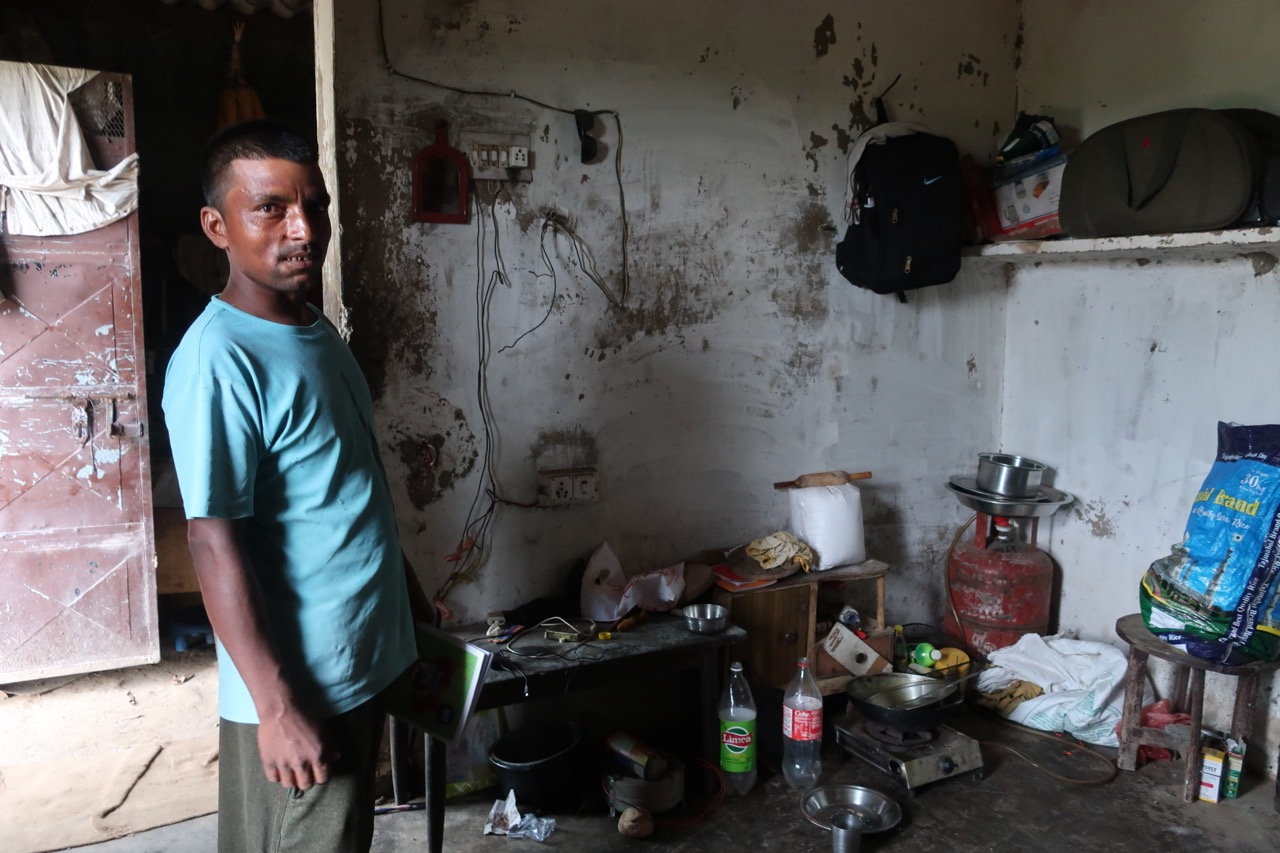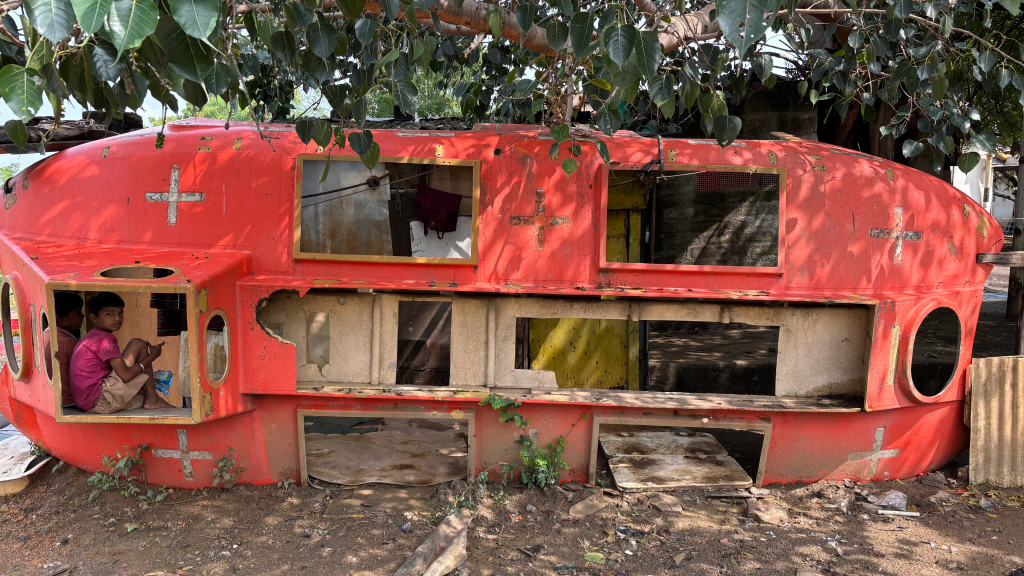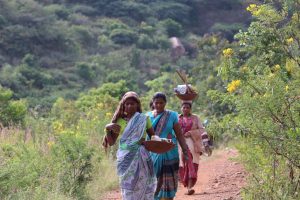MOHALI, Punjab: Pappu Ram, 48, is the only migrant worker who still lives in Mundho Sangtian village in Mohali district, close to Chandigarh in south-east Punjab.
All the other migrant families have left the village over the past month following a controversial resolution passed by local residents in July, that barred them from renting homes in the village and declared that they could not register their Aadhaar or voter cards in the village.
The resolution, which has since been termed illegal and revoked by the village, triggered an exodus of migrant workers.
Ram and his family, however, did not leave.
“We came to know about the resolution after four-five days. When we inquired about it, people in the village said that the resolution was passed to remove one (migrant) family that was creating problems,” he told The Migration Story.
Sitting in his rented home on the edge of Mundho Sangtian, Ram, however, knew well that the resolution would have applied to his family as well and understands why many chose to leave.
“Others left fearing what might happen, that they could be forced out,” said Ram, adding that some workers, including those who had recently migrated, had still not found jobs back home.
“There have been incidents of theft in the village, especially at places of worship and in some cases migrants were caught, but the police did not act,” said Sandeep Singh, a resident of Mundho Sangtian who was part of the group that pushed for the resolution.
“We have to think about harmony in the village,” he said.
After a public interest litigation was filed in the Punjab and Haryana High Court, stating that the resolution violated the fundamental rights of migrant workers, the district administration has set-up a five-member committee to protect the rights of migrant workers.
The case was disposed of by the High Court and most villagers who had signed the resolution also apologised.
But the migrant workers have not yet returned to Mundho Sangtian, as reports on similar resolutions passed by neighbouring villages emerge.
About 18 km away, in Jandpur village, a similar diktat was passed telling migrant workers not to venture out after 9 pm and to wear appropriate clothing, mandating police verification for those renting houses in the village, stipulating that not more than two people should rent a room, and making landlords responsible for their migrant tenants’ actions.
This resolution also led migrants leaving Jandpur, even as the police intervened and the villagers replaced the word ‘migrants’ with ‘kirayedaar’, or tenants, in the resolution.
These are not isolated incidents, researchers and campaigners working on migrant workers’ rights said, pointing to similar instances that have happened in other parts of India as well.
‘ILLEGAL’ RESOLUTIONS
Agriculture in Punjab is largely dependent on migrant workers from Bihar, Uttar Pradesh and other states as farm owners hire them for sowing and transplanting paddy.
The population, both rural and urban, of migrants in Punjab was 3.9 million in 2016, according to a survey conducted by the migrant wing of the state government. This number is expected to have risen since.
The resolution, however, was not passed by the village panchayat and lacked support from Sarpanch Jaspal Singh, who said that “four-five people moved this resolution and did not bring it to the panchayat (elected village level self-governance institution)”.
Manjit Singh, retired Professor of Sociology at Panjab University in Chandigarh questioned the validity of the resolution that had not been passed by the panchayat.
“It is not legally valid. If they claim that it was passed by the Gram Sabha (assembly of village adults registered to vote), was due procedure followed?” he said.
“I come during the paddy transplantation season, stay here for 4-5 months and then go back to Purnia,” he said. Shankar never brought his family along, as most migrant labour, all men, lived in motor rooms (rooms where irrigation pumps and other farm equipment is stored) on the farm itself.
The Mundho Sangtian villagers seem to have no problem with the migrants living outside the village, on the farms.
“Some of the migrants staying in motor rooms on farms have been here for nearly 30-40 years. They do not come to the village. We have no problem with them,” said Sandeep Singh, defending the Mundho Sangtian resolution he was part of and identifying migrant workers who choose to live with their families inside the village as those who needed to follow the new norms.
Migrants like Ram, who eventually bring their families, have been renting rooms in villages as these are more affordable than accommodation in nearby towns and cities, where many travel to work in factories or on construction sites.
Ram’s family rents a set of four rooms for Rs 1,200 a month, in a muddy alley in Mundho Sangtian, tucked between two houses that belong to landlords. The rooms lack proper doors, and the family has put up curtains for privacy.
Ram, who initially migrated seasonally, gradually settled down in the village. Both his sons were born and got married here. Their Aadhaar and voter cards are registered in Mundho Sangtian.
Ram also aspires to obtain both documents for himself and was in the process of acquiring them. But both Aadhaar and voter ID registration has become a contentious issue with the resolution stating that “Aadhaar card and voter card of migrants will not be registered in this village.”
“If they put restrictions on everything, who will come here?” he asked.
MIGRANT-DEPENDANT AGRICULTURE
The uncertainty of income in Purnia village was a challenge, said Ram, recalling his decision to move out of Bihar to seek a living.
“Every family has at least one person working outside the state so that there is surety of income,” he said, adding that in Mundho Sangtian, he earns Rs 500 per day working as farm labour.
Over the years, he began going back to Bihar less frequently and instead picked up other jobs in Punjab’s lean season for agriculture.
“When there is no farm work, I bring vegetables from Kurali (the town nearby) and sell them in the village, or work as a construction worker with a mistri (foreman),” he said, adding that one of his sons, Manhor (24), also works as a construction worker, earning Rs 800 per day when work is available.
Together, the family saves up to Rs 15,000 every month.
It is this steady work and income that brings migrant workers to villages across Punjab, where the recent resolutions have created an atmosphere of uncertainty.
Migrants working in Sialba village, four km from Mundho Sangtian, have also heard about these resolutions.
Sadanand, a migrant worker in Sialba who gave only his first name, has been coming here from Bihar’s Araria district to work for several years now. “We stay at Kadimajra village and come to work in farms at Sialba,” he said.
Sadanand and other migrants working with him fear that such resolutions will hit their income. “We come here to work as there is no major earning source for us back home.”
Professor Manjit Singh believes that this mistrust between the locals and the migrants will not last long.
“It is not the first time something like this is happening. These people will need labour to work in their fields and when the need arises, they will put these incidents behind them,” he said.
After the court disposed of the PIL and villagers who moved the resolution apologised, would the migrant workers return?
“Migrants remain vulnerable as the local people always have an upper hand. It needs to be seen whether the administration’s actions bring back migrants to the village. We would be able to tell if everything is fine only after a few months,” said Professor Manjit Singh.
Migrant workers in these villages told The Migration Story that the earnings of the workers who left in a hurry and returned to their home state had already been hit, with many unable to find work immediately.
Ram said that the workers who have left might return to Mundho Sangtian after hearing the news about the case and the apology. He said that those who signed the resolution have already been asking for labour to work in their farms.
“They would need labour, wouldn’t they?” he asked. “Where would they find workers if they don’t want us here?”
Edited by – Lesley A. Esteves
Arshdeep Arshi is a Chandigarh based independent journalist, reporting on gender, human rights, climate issues and craft of Punjab region.
















